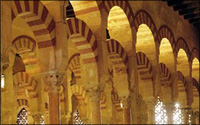 The Golden Age of the Jews in Spain lasted roughly from the tenth through twelfth centuries. With rare exceptions, the Spanish Jews never had the persecution complex that Ashkenazic-European Jewry experienced in France and Germany. The exceptions were periodic rebellions by fanatical Muslim sects who did not like the laxity of the Moors.
The Golden Age of the Jews in Spain lasted roughly from the tenth through twelfth centuries. With rare exceptions, the Spanish Jews never had the persecution complex that Ashkenazic-European Jewry experienced in France and Germany. The exceptions were periodic rebellions by fanatical Muslim sects who did not like the laxity of the Moors.
In the history of Islam, tremendous fundamentalist revolutions erupt from time to time. In our days, it happened in Iran (1970s) and Saudi Arabia (1920s). It is cyclical. Eruptions of fanatical Islam are as predictable as an unstable volcano.
There will be two or three such eruptions in Spain even during the “golden” period for the Jews. Nevertheless, the Golden Age was marked by Jews living in a liberal, tolerant society. Jews not only moved freely but felt themselves part of the society.
Nevertheless, it was a Golden Age in a relative sense. It was certainly golden relative to the treatment of the Jews in France and the Rhineland at that time. But in comparison to American Jewry it was far from a Golden Age. American Jews would find it hard to adapt to the problems that beset the Jewish community in Spain at that time.
Living in a Fractious Muslim Culture
Spain under Muslim rule did not have a strong central government. Originally, when the Berbers and Moors came north into Spain the emperor was Abdul al-Rahman. He united some 60% of the Spanish peninsula under his rule. However, the Arabs are very fractious. The Arab dream of having one universal pan-Arabic state stretching from the Atlantic in the west to the Indian Ocean in the east has never been close to reality.
Abdul al-Rahman abetted the fractiousness by giving away little pieces of his kingdom to friends and family – and he had many wives with many children. The modern day Saudi Arabian monarch has 2,000 princes. Everyone wants his Ferrari and oil well. Abdul al-Rahman parceled out the country to children, uncles, nephews and people he owed favors to. Within 50 years of the Muslim invasion, Spain was made up of hundreds of pieces ruled by its own dictator.
Some rulers were benevolent, generous, wise and kind. Others were unworthy of any type of leadership. The Jews were therefore at the mercy not of one central government, but all of these differing princes and noblemen who were always changing allegiances. The Jews often found themselves backing both sides. Some backed those in power while others backed those trying to gain power. On one hand, that caused a great deal of anti-Semitism. Your opponent always had Jews helping him. But, on the other hand, it also helped guarantee Jewish survival and success, because there were always Jews on the side of the winner.
Naturally, this fractured the Jewish community as well. The Jews were never monolithic. We say “the Jews,” but there was no such thing. There were – just as there are today – all kinds of Jews with all kinds of shifting allegiances and loyalties, most of which have nothing to do with Judaism. In the ancient world, for instance, the Caliph of Seville had Jewish advisors and the Prince of Cordova had Jewish advisors, pitting Jew against Jew. In short, the quarrels among the ruling Muslim world were often reflected in the Jewish world.
Hasdai Ibn Shaprut
Early Spanish Jewry produced numerous outstanding individuals. One was Hasdai ibn Shaprut, who lived in the tenth century. He rose to a high level of influence in government and became the most influential Jew in Spain. He was engaged in a great deal of negotiation on behalf of the Arab monarch.
Arab kings used the Jews as their emissaries to the Christians. They were afraid to send Muslims, especially the fanatical Muslims who viewed the Christians as infidels. The less pious Muslims were afraid that the Christians would kill them, as often happened. Many such ambassadors never got back home. Therefore, the Jews were entrusted with these types of delicate negotiations. One of the reasons that the Jews occupied such high positions – positions we would call the Foreign Ministry – was because the Jews, in their own way, were acceptable to both sides. The Christians sent Jews to negotiate with the Muslims as well. The idea of a Jewish official – a Court Jew — remained an institution throughout the Middle Ages.
Hasdai ibn Shaprut was able to enlist countless Jews for what we would call the Foreign Office or State Department of the Muslims rulers of Spain to serve as emissaries to the Christian countries. This enabled them to rise to prominence, wealth and power.
Aristotelian Philosophy
A major characteristic of Spanish Jewry was its interest in philosophy.
Jewish life does not exist in a vacuum. It impacts upon, but is also impacted upon by the society that hosts it. Even though the Quran is not a philosophical book, in terms of giving a rationale for beliefs, a man named ibn Rashid, who is known in the Western world as Averroes, was able to take the philosophy of the Greeks and conform Islam to the structure, at least, of Greek philosophy.
The same time Christianity was undergoing its exploration into Greek philosophy. Probably the most famous and basic philosophic attempt to explain Christianity in a rational fashion was by a North African monk, Thomas Aquinas. He remains today the basic philosopher of the Roman Catholic religion. He, more than anyone else, was responsible for the Church being bound to Aristotelian ideas and his geo-cosmic view of the world. That is why the Church never renounced its condemnation of Galileo (although, finally in 1992, Pope John Paul II did express regret for how the Galileo affair was handled).
The philosophy of Aquinas had a profound influence not only in the Church but outside of it as well. The Muslim response to it was found in the works of Averroes. He restates the Muslim beliefs in a philosophic-Aristotelian fashion. The Jews too felt compelled to come up with a book of their own that dealt with the world in that fashion, culminating in Maimonides influential book, The Guide For The Perplexed. Indeed, an understanding of Aristotelian philosophy in many higher schools of thought today requires a reading of all three works: Aquinas, Averroes and Maimonides.
In our days, Aristotle is irrelevant. One can graduate from very good colleges without knowing anything about Aristotle. In general, philosophy itself does not play a very great role in our lives. We are not interested how it works… as long as it works. The grander problems of life take second position to the practical problems of life.
Nevertheless, in the medieval world philosophy was of prime importance. And in the medieval world, Aristotle was right. In order for one to be relevant, one had to conform one’s ideas to the system of Aristotle or at least explain it through Aristotelian notions. The common denominator of all the philosophies of this period was that they somehow had to fit into the Aristotelian scheme of the world.
Previously, we discussed the great Rabbi Saadiah Goan and his book, The Book of Beliefs and Opinions. Written in Arabic, it was meant to fill this void. The reason it did not was because it was not an Aristotelian book. Today it is more relevant than those based on Aristotle simply because he did not tie himself to Aristotle’s ideas and viewpoint of the universe. However, it was not popular among Spanish Jews; it was almost never even quoted.
Aristotle saw a very ordered world in which every fit and everything had a reason. If it could not be explained then somehow it did not conform to natural law and could not be correct. Aristotle extended this even to the position of the stars in the heavens. Therefore, when Copernicus and Galileo much later proved the position of the stars did not conform to Aristotle it created a monumental problem – a problem the Church wrestles with today. Of course, most people today are fairly well convinced that the world is round, the sun is at the center of our solar system and the earth moves around it. In Aristotle’s world the sun and stars revolved around the earth. Therefore, once Aristotle became Aquinas, so to speak, and once the Pope, who was believed to be infallible, said Aquinas was right they painted themselves into a corner.
The Spanish Jews did not take it to that extreme. Maimonides himself, in his magnum opus, the Mishnah Torah, points out that Judaism does not depend upon philosophy. Later, we will discuss the great Jewish philosophical book called the Kuzari by the Spanish Jew Rabbi Judah Halevi, but that has withstood the test of time because it was basically non-Aristotelian and provides for the fact that it will not explain everything.
Even though Spanish Jewry did not take Aristotelian philosophy to the extreme the Catholic Church did, nevertheless it felt compelled to provide a philosophy of life and religion. This, more than anything else, set Spanish Jewry off from Ashkenazic Jewry. And this would also cause Spanish Jewry unique problems. Despite the philosopher’s attempts to make everything fit, there will inevitably be certain events in the life of every individual, as well as in the life of the Jewish nation generally, that just cannot be explained, that are not going to fit in any rule.
Philosophy is like a blanket that is too small. A person tries to cover himself and moves it to one part of his body. But then he exposes a different part. He moves it to cover that part but exposes something else. No matter what he does the blanket is always too small to cover everything. Something is always sticking out. That is philosophy. Even the best ones.
The Ashkenazic Jews came to a very easy solution to the problems of life’s philosophic inconsistencies. In Yiddish it is summarized by the statement, “Nobody ever died from a question.” People have questions. The Talmud itself sometimes ends a long debate with the word: kasha, meaning, “It’s a question.” We are finite. We are limited. That is a gross oversimplification, of course, but that is the basic Ashkenazic response. If you want an answer to all the questions you will have to wait until you go to the next world.
However, in a world where the other religions were claiming that there was no room left for doubt and that everything had to be explained, that answer was rejected. And that was one of great differences between Ashkenazic and Spanish Jewry. The latter were unwilling to accept that answer. They had to have a philosophic answer.
When the answer did not suffice, many Spanish Jews whose faith was tied to Aristotelian philosophy were doomed to disappointment and lost their faith.











